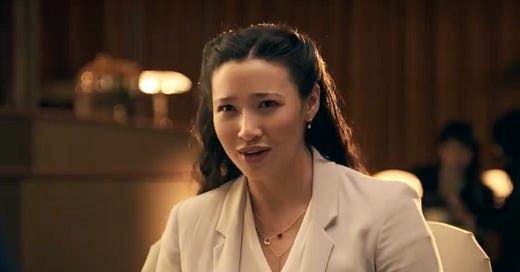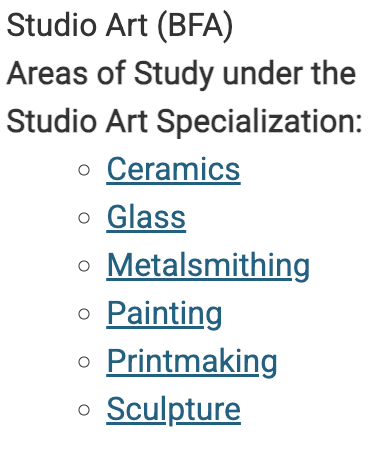On Indeed's "The World Can Work Better" Ad
Saying "underwater basket weaving" without saying it
I have been watching a lot of college basketball recently. The only downside to this is that it means I’ve also been watching a lot of commercials recently. One of them sticks out, and I’d like to reflect on it today.
It’s an ad from Indeed. It is part of an ad campaign intended to show how much using Indeed will help you cut through the pointless obfuscation of the job search process.
One ad in particular focuses on college degrees. In it, a woman is interviewing for a job at a hotel. While she has relevant job experience, she doesn’t have a college degree. Her interviewer insists that a degree is required, even if it’s not connected to the job.
The applicant is befuddled. Here’s her befuddled face:
She asks if she’d be hirable if she had a degree in:
Dutch poetry?
Zoology?
Metalsmithing?
Poultry science?
The interviewer says “yes” to each question. Ridiculous! Time to use the Indeed app:
What luck! Anyway, what did this interviewer get his degree in to sit in judgment over her? He replies that he studied “dance.” Then he smiles and makes jazz hands.
The stated aim of the ad is to make sure you only apply for jobs that match your experience. But it also seems to have some things to say about what kinds of experiences are valuable.
I’d like to start by digging into that list of majors they reeled off.
Dutch Poetry
This is the first major that the applicant lists. Could she get the job even if she did something as weird as “Dutch poetry”??
My question is whether that’s even a major. There are a couple ways to find out. I’ll start by using the College Navigator tool. This product is related to IPEDS, but it’s much more user-friendly. You can easily set parameters for college searches, including finding which schools offer which majors.
The tool isn’t perfect. Schools may lump majors together in their reporting or may not find an equivalent in the federal data selection tool. But let’s look for Dutch Poetry majors anyway.
Okay, so I could see how you might read “Dutch Language and Literature” and paraphrase it as “Dutch poetry.” But how many colleges even offer it? And what kind of degree is it?
That’s the whole list. I don’t imagine there are many lists that only have these two schools.
You can also see how many students graduated in each offered major in the past year. For both universities, zero students got a “Dutch” degree.
Dordt offers the major because they were founded by the Dutch Reformed Church. Cal offers it because they offer lots of stuff. But your experience at either school would be similar: mostly Dutch language courses. If you’re doing any literature in Dutch, it’s not going to exclusively be poetry.
As a fun fact, there’s no such thing as a “poetry” major, not even in English. Even at the graduate level, there are degrees in “English” or “literature” or “creative writing,” but not poetry. So this applicant actually couldn’t get a job with a Dutch poetry major because she couldn’t get a Dutch poetry major.
Zoology
This one is basically the opposite of Dutch poetry. It’s super common and also real!
There are 59 schools offering the major. There are also related majors like animal behavior, and basically every university offers a biology major, which will overlap in many areas with zoology.
Zoology isn’t fake, but it does start with the letter “Z” which makes it sound weird. And I’ll admit it’s not that closely related to hospitality.
Metalsmithing
College Navigator has no category for metalsmithing. It doesn’t recognize it as a major.
It does count 13 community colleges which offer 2-year degrees in “gunsmithing,” but that’s the only “smithing” major to be seen.
So what’s going on?
I resorted to Google and found this list, which identified several metalsmithing and blacksmithing degrees. We can take Southern Illinois as an example:
The parenthetical is key here. You can’t major in metalsmithing because metalsmithing isn’t a major; it’s a concentration.
Concentrations show up in all sorts of degrees. They allow for specialization within a major, but they don’t offer enough distinct coursework to be separate majors. So, metalsmithing is one of several tracks that gets rolled up into a BFA: Studio Art major for reporting purposes:
This is basically how it works at other universities which offer metalsmithing too. So, I suppose our applicant should have asked if she could have gotten a “BFA in Studio Art with a specialization in metalworking,” but that’s a bit of a mouthful for a thirty-second commercial.
Poultry Science
This one is also a “random animal”-sounding major, much like zoology. It’s much less common though. Only seven universities offer the degree:
By looking at each institution’s profile, you can see that 125 people got a bachelor’s degree in poultry science. Texas A&M has the biggest program, and it’s pretty strenuous.
Would studying that have been a waste of time? Would she have learned about anything other than eggs?
Dance
This one is nowhere near as niche as the others in the commercial. College Navigator lists 268 bachelor's degree programs in dance. I’ve written about it before.
What is has in common with the other majors is that it’s easy to see it as “weird.” You see it in the interviewer’s apologetic jazz hands. He seems to be saying that he knows that his major is irrelevant, but that’s “just the way it is.”
Is education experience?
While the ad does not claim that college is unimportant, we are clearly meant to empathize with the applicant who lacks a degree. One implication of the commercial is that some companies are smart enough to hire you based on your experience, not just your education.
I think the commercial cited this range of five “weird” majors, real or invented, because there’s also an assumption of the college degree as vocational. If you go to college for poultry science, presumably you’re destined for a life of chicken management and nothing else, right?
In theory, what distinguishes a bachelor’s degree from a training certificate is that you’ve done more than just gain one skill. A justification of general education is that it helps students build a breadth of competencies instead of just training for one job.
Moreover, the scale of a four-year degree will require students to do more than just learn job skills. A degree implies, if nothing else, that a graduate was able to commit to a project of personal development over the course of multiple years. That project was “going to school.”
Every time people judge candidates for jobs or schools, part of their work is deferring to past judgments. So if you see that a person went to college, you may defer to the work of that college’s admissions team and conclude “Well, they must have been a good student.” If you see the college let them graduate, then you can say “Well, they must have remained a good student over the long haul.”
Processes like hiring often involve making significant monetary commitments to strangers. These kinds of application requirements may serve as a way to gather more information. Work experience is usually required in addition to education, but a requirement for education (even in Dutch poetry) may be required just to see if candidates are good at committing to projects of self-development over time.
That being said, the commercial hits on the fact that that’s probably not fair. Lots of people don’t go to college or don’t complete it, and it’s not because they lack grit. There are myriad circumstantial factors that make the binary “degree completion” metric unfeasible without changing the quality of that person’s capacity to work.
But in order to understand that, the applicant would need to be understood more deeply and personally. That’s hard. Checking for credentials like college degrees? That’s easy.
Breadth by implication
I think getting a degree in any field can mean something. I don’t think it’s fair to pick on Netherlandic nerds. The experience of getting a degree can teach you a lot to prepare you for a broad range of paths.
But universities are not required to train their students broadly.
Many students will primarily take courses related to their major. This means that they must either be “broadened” in the few classes outside their major that they take, or there must be a hidden “breadth” in their major-related courses. Either of these things certainly can happen, but the large-scale higher education institution cannot guarantee that it will.
When institutions get as large as many universities are, it’s hard to really control for what any student gets out of their experience. And if the institution doesn’t have a clear vision of its educational mission beyond “educate,” then the experience of pursuing a degree can be wildly different in narrowness or breadth for every student.
I don’t know whether that hotel should require a college degree or not. Maybe there are things you need to attend college in order to learn. But this is probably a function of the degree substituting for a lack of relationship between employer and applicant. The degree stands for “something” in the mind of the employer, whether that “thing” is true to the applicant’s experience or not.
The ad also implies that this line of thinking is becoming less popular. Perhaps that’s because that “something” that employers expect to come with a college degree isn’t representative of what’s happening at the university after all.
But that’s a question for another day.
-Matt












It's a special thing that I personally know many people who went to Dordt University simply because my husband (who is Latino) was a Dutch Reformed pastor, lol. I like your last line, and I have often asked if the values represented by my college degree are what prospective employers see. Do we both value it for the same things? And what should a college degree represent if it no longer really equates with a true work ethic and commitment? I believe in the trades as well as the importance of a liberal education (the Johnnie way). But is having both a necessity for all? I am trying to figure that out for my kids. The girls love their liberal education, and my boys not so much.
Another clever (and related, IMHO) point in that commercial is when the interviewer reveals his degree is in "Dance", it emphasizes the foolishness of many employers who truly "dance" around the college degree game. I thought that a witty jab at the job market.